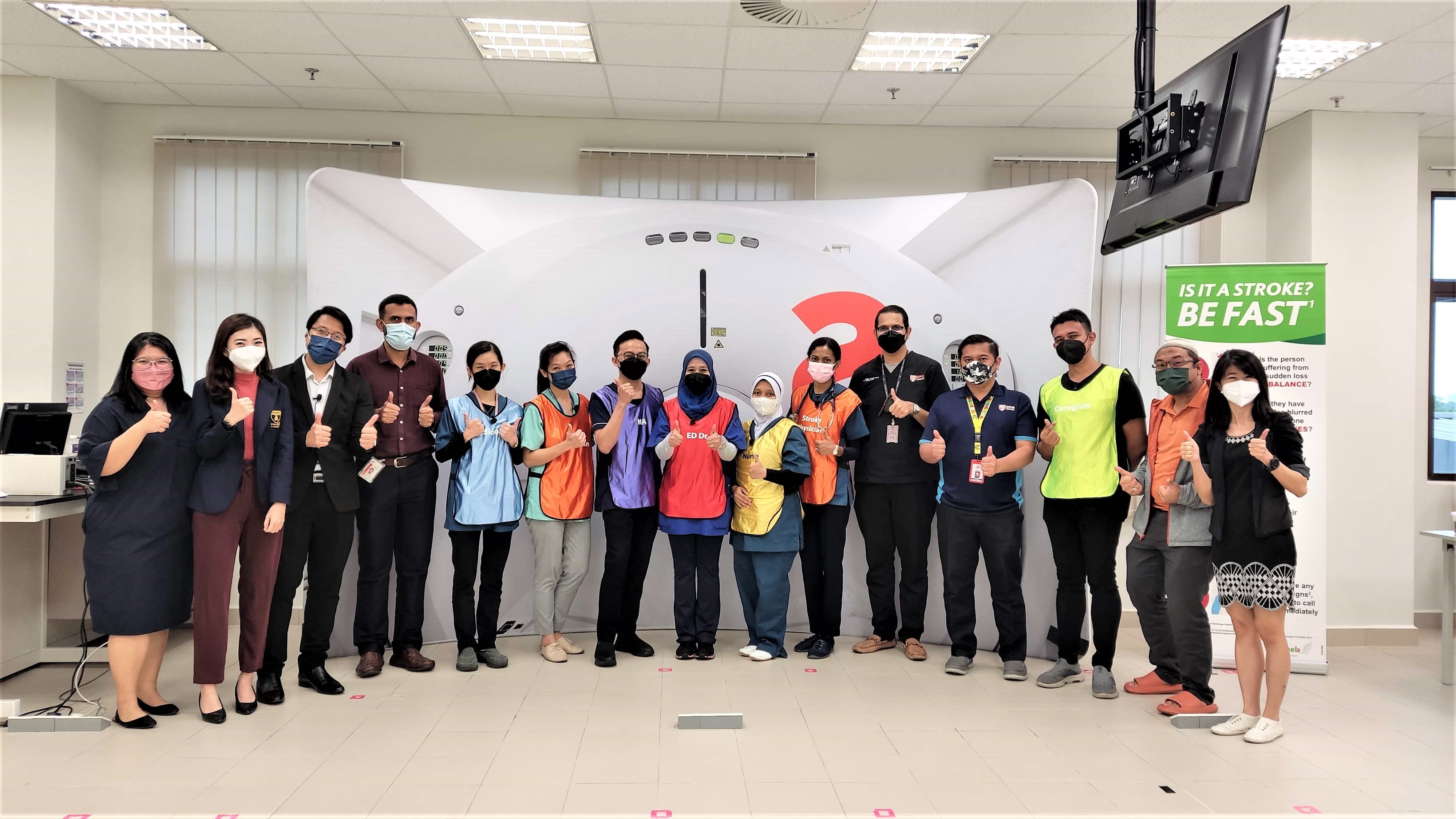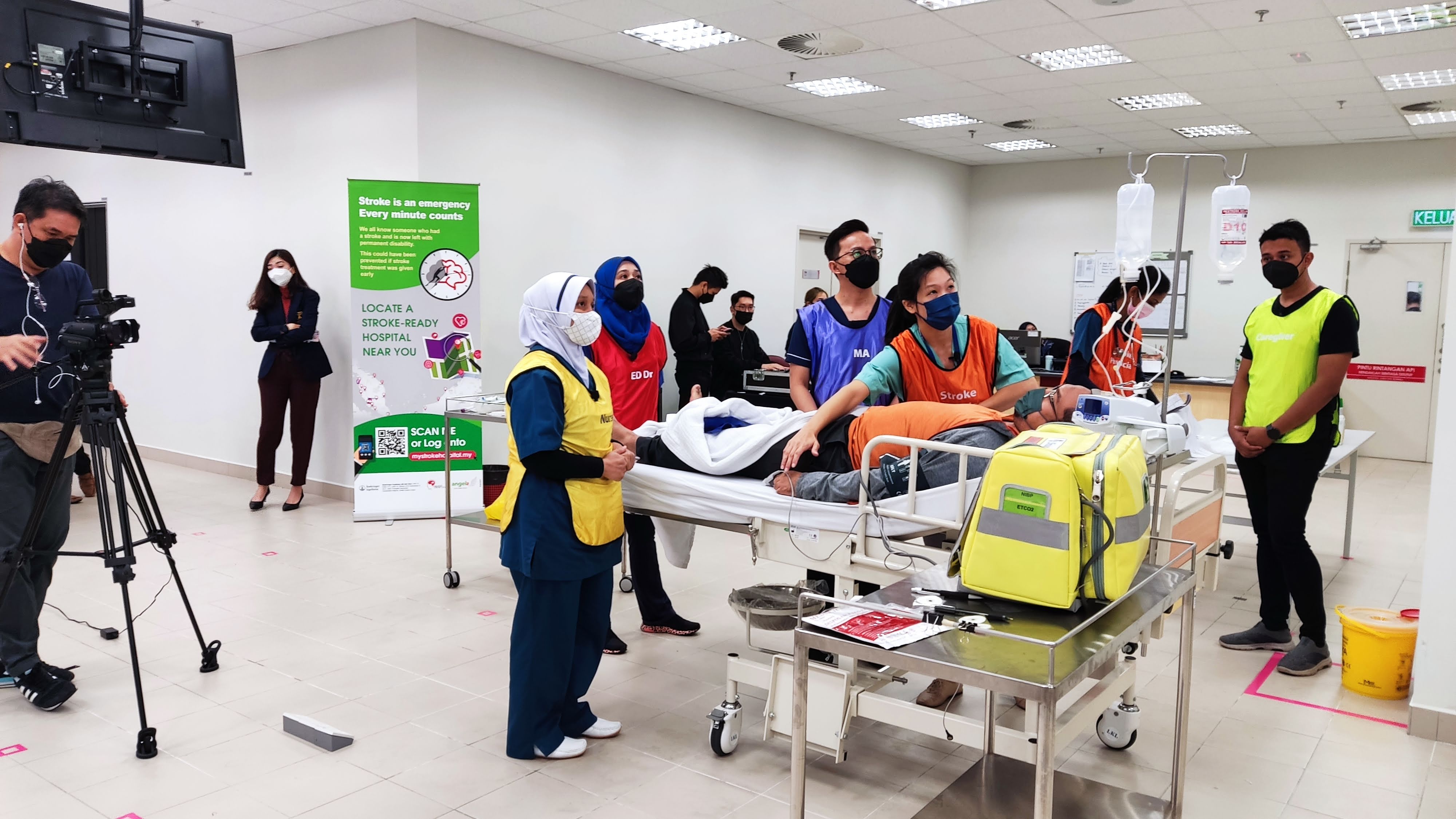
ATHLETES établit rarement des enregistrements pendant la formation. Cela est dû au fait que les êtres humains ont besoin de concurrence pour tester les limites de nos capacités. La concurrence augmente les efforts, améliore les performances et stimule la créativité. Il rappelle aux membres de la même équipe qu’ils travaillent tous vers le même objectif et les motive à réussir ensemble.
C’est aussi vrai pour les équipes spécialistes de l’accident vasculaire cérébral que pour les équipes sportives, selon l’équipe Angels en Malaisie. En mars 2022, ils ont invité trois hôpitaux à se battre pour un défi d’équipe de simulation qui, pour la première fois, tirerait parti des avantages d’une compétition amicale dans la lutte pour améliorer les soins neuro-vasculaires en Malaisie.
Les objectifs, selon Elva Phan, consultant Angels et responsable du programme de soins neuro-vasculaires du pays, étaient d’identifier les lacunes dans le parcours hospitalier et de créer un scénario dans lequel les équipes pourraient apprendre les unes des autres. Ils s’attendaient à ce que la concurrence mène à des niveaux de performance plus élevés, renforcent les relations au sein des équipes et stimulent l’esprit d’équipe.
Le défi d’équipe de simulation inaugural était un concours à trois voies entre pairs qui a eu lieu au centre de simulation de l’Hôpital Pengajar UPM (HPUPM) à Serdang, environ 30 minutes au sud de Kuala Lumpur. Dans le mix étaient les hôtes de l’HPUPM, qui en 2020 est devenue le premier centre neuro-vasculaire à volume élevé de Malaisie avec une unité d’urgence dédiée à l’accident vasculaire cérébral et qui a remporté son premier prix Diamant Angels de la WSO en 2021. Deux fois vainqueurs du prix Diamant de l’hôpital Tuanka Ja’afar, dont l’équipe spécialiste de l’accident vasculaire cérébral a fait remarquer une durée médiane délai d’attente avant la prise en charge de classe mondiale de 25 minutes au poids de la pandémie, et l’hôpital Sultanah Zahirah de la ville côtière, Kuala Terengganu.

Le concours a débuté à 8 h 30 le vendredi 4 mars, lorsque les équipes ont été informées par l’animateur, le Dr Abdul Hanif Khan, et dirigé par le juge en chef, le Dr Wan Asyraf Wan Zaidi, vainqueur de l’Esprit d’excellence 2022, neurologue de l’hôpital Canselor Tuanku Muhriz UKM. Ils ont tous dû prendre en charge le même cas de suspicion d’accident vasculaire cérébral impliquant un homme de 41 ans présentant une déviation du regard droit et un léger mélange observé au cours des deux heures précédentes. Leur performance serait enregistrée et évaluée par quatre juges, les résultats étant annoncés et discutés lors d’un atelier multidisciplinaire Angels le lendemain.
Les équipes pourraient gagner 25 % dans chacun des domaines suivants : l’approche du parcours et le score NIHSS, l’interprétation des TDM, la prise de décision et délai d’attente avant la prise en charge, avec une prime de 10 % pour le travail d’équipe et l’excellence globale. Les critères de jugement reflétaient les principales actions prioritaires pour une prise en charge optimale du parcours de l’accident vasculaire cérébral. Par exemple, dans l’évaluation du délai d’attente avant la prise en charge, les équipes pouvaient s’attendre à perdre des points s’ils optaient d’attendre plus d’imagerie après l’exclusion du saignement et de l’occlusion des gros vaisseaux, ou s’ils avaient déplacé le patient aux service des urgences plutôt que de commencer le traitement lors de la TDM.
Pour les équipes concurrentes, l'après-midi suivant n'a pas pu venir assez tôt. C’est à ce moment-là que les participants en personne et en ligne à l’atelier multidisciplinaire auront l’occasion de regarder les vidéos de simulation et après les commentaires du Dr Wan Asyraf Wan Zaidi, le Dr Abdul Hanif Khan annoncera les résultats.
Applause a rempli l'auditorium HPUPM en tant que l'hôpital Tuanku Ja'afar a été nommé gagnant du premier défi de l'équipe de simulation en Malaisie. Ils avaient également enregistré le meilleur temps de DTN avec 15 minutes et 56 secondes, en délimitant l’HPUPM avec 17 minutes et 11 secondes, et l’hôpital Sultanah Nur Zahirah a fait remonter l’arrière avec une impressionnante valeur de 21 minutes et 48 secondes.
En fin de compte, cependant, le fait de gagner était moins important que les leçons que chaque équipe avait apprises de leurs concurrents et rapporterait à leurs hôpitaux. Les participants à l’atelier avaient également apprécié un siège à l’avant-garde lors d’une session de partage des meilleures pratiques.
Elva rapporte que, dans les six mois suivant l’événement, les délais médians d’attente avant la prise en charge de l’AVC pour les centres accident vasculaire cérébral ont chuté de 64 à 56 minutes, et que d’autres hôpitaux de groupe avaient manifesté leur intérêt à répliquer la concurrence dans leurs propres centres.
Le Conseil malaisien de l’AVC, dont le président associé, le professeur Hoo Fan Kee, a organisé l’ouverture de l’atelier, a également reconnu le potentiel d’un défi d’équipe à grande échelle pour améliorer les performances de l’équipe spécialiste de l’accident vasculaire cérébral.
En augmentant la qualité du traitement de l’accident vasculaire cérébral dans tous les hôpitaux participants, il s’agit d’une compétition où il n’y a pas de perdants, et où les patients et leurs proches sont les véritables gagnants.


